初中英语动词不定式讲解及练习
初中英语动词不定式精讲精练-潘老师
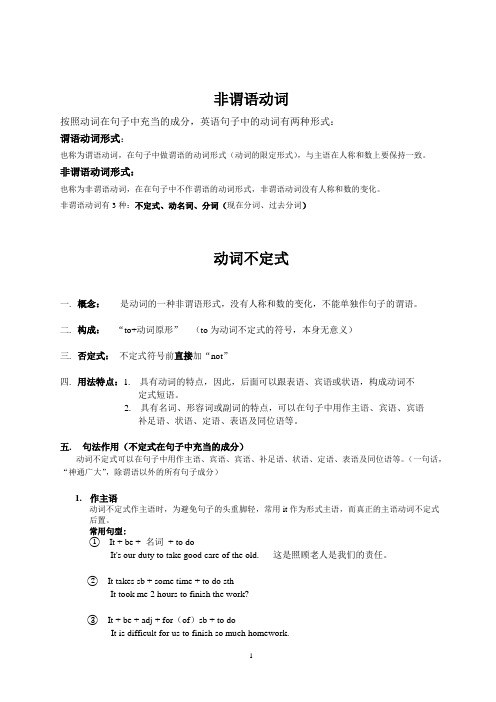
非谓语动词按照动词在句子中充当的成分,英语句子中的动词有两种形式:谓语动词形式:也称为谓语动词,在句子中做谓语的动词形式(动词的限定形式),与主语在人称和数上要保持一致。
非谓语动词形式:也称为非谓语动词,在在句子中不作谓语的动词形式,非谓语动词没有人称和数的变化。
非谓语动词有3种:不定式、动名词、分词(现在分词、过去分词)动词不定式一.概念:是动词的一种非谓语形式,没有人称和数的变化,不能单独作句子的谓语。
二.构成:“to+动词原形”(to为动词不定式的符号,本身无意义)三.否定式:不定式符号前直接加“not”四.用法特点:1.具有动词的特点,因此,后面可以跟表语、宾语或状语,构成动词不定式短语。
2. 具有名词、形容词或副词的特点,可以在句子中用作主语、宾语、宾语补足语、状语、定语、表语及同位语等。
五.句法作用(不定式在句子中充当的成分)动词不定式可以在句子中用作主语、宾语、宾语、补足语、状语、定语、表语及同位语等。
(一句话,“神通广大”,除谓语以外的所有句子成分)1.作主语动词不定式作主语时,为避免句子的头重脚轻,常用it作为形式主语,而真正的主语动词不定式后置。
常用句型:①It + be + 名词+ to doIt's our duty to take good care of the old. 这是照顾老人是我们的责任。
②It takes sb + some time + to do sthIt took me 2 hours to finish the work?③It + be + adj + for(of)sb + to doIt is difficult for us to finish so much homework.It's important for us to protect our environment 保护环境对于我们很重要的。
It's very kind of you to help me. 你帮助我真是太好啦。
动词不定式讲解,专项练习及答案
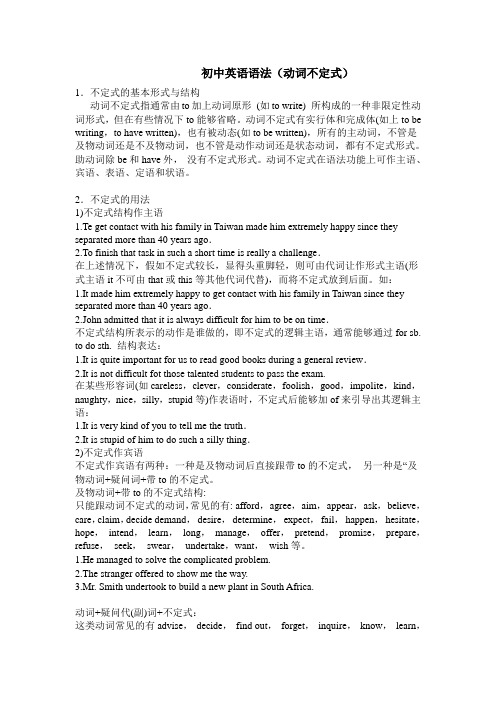
初中英语语法(动词不定式)1.不定式的基本形式与结构动词不定式指通常由to加上动词原形(如to write) 所构成的一种非限定性动词形式,但在有些情况下to能够省略。
动词不定式有实行体和完成体(如上to be writing,to have written),也有被动态(如to be written),所有的主动词,不管是及物动词还是不及物动词,也不管是动作动词还是状态动词,都有不定式形式。
助动词除be和have外,没有不定式形式。
动词不定式在语法功能上可作主语、宾语、表语、定语和状语。
2.不定式的用法1)不定式结构作主语1.Te get contact with his family in Taiwan made him extremely happy since they separated more than 40 years ago.2.To finish that task in such a short time is really a challenge.在上述情况下,假如不定式较长,显得头重脚轻,则可由代词让作形式主语(形式主语it不可由that或this等其他代词代替),而将不定式放到后面。
如:1.It made him extremely happy to get contact with his family in Taiwan since they separated more than 40 years ago.2.John admitted that it is always difficult for him to be on time.不定式结构所表示的动作是谁做的,即不定式的逻辑主语,通常能够通过for sb. to do sth. 结构表达:1.It is quite important for us to read good books during a general review.2.It is not difficult fot those talented students to pass the exam.在某些形容词(如careless,clever,considerate,foolish,good,impolite,kind,naughty,nice,silly,stupid等)作表语时,不定式后能够加of来引导出其逻辑主语:1.It is very kind of you to tell me the truth.2.It is stupid of him to do such a silly thing.2)不定式作宾语不定式作宾语有两种:一种是及物动词后直接跟带to的不定式,另一种是“及物动词+疑问词+带to的不定式。
中考英语非谓语动词用法系列讲座---动词不定式、动名词及动词过去分词精讲及练习
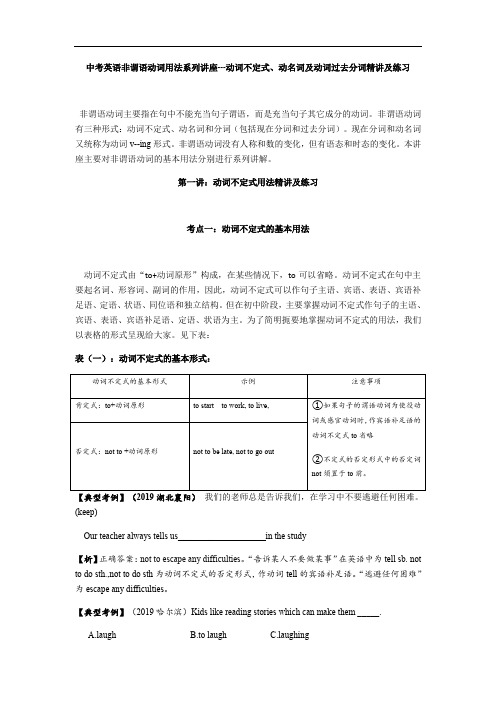
中考英语非谓语动词用法系列讲座---动词不定式、动名词及动词过去分词精讲及练习非谓语动词主要指在句中不能充当句子谓语,而是充当句子其它成分的动词。
非谓语动词有三种形式:动词不定式、动名词和分词(包括现在分词和过去分词)。
现在分词和动名词又统称为动词v--ing形式。
非谓语动词没有人称和数的变化,但有语态和时态的变化。
本讲座主要对非谓语动词的基本用法分别进行系列讲解。
第一讲:动词不定式用法精讲及练习考点一:动词不定式的基本用法动词不定式由“to+动词原形”构成,在某些情况下,to可以省略。
动词不定式在句中主要起名词、形容词、副词的作用,因此,动词不定式可以作句子主语、宾语、表语、宾语补足语、定语、状语、同位语和独立结构。
但在初中阶段,主要掌握动词不定式作句子的主语、宾语、表语、宾语补足语、定语、状语为主。
为了简明扼要地掌握动词不定式的用法,我们以表格的形式呈现给大家。
见下表:表(一):动词不定式的基本形式:【典型考例】(2019湖北襄阳)我们的老师总是告诉我们,在学习中不要逃避任何困难。
(keep)Our teacher always tells us___ _ in the study【析】正确答案:not to escape any difficulties。
“告诉某人不要做某事”在英语中为tell sb. not to do sth.,not to do sth为动词不定式的否定形式,作动词tell的宾语补足语。
“逃避任何困难”为escape any difficulties。
【典型考例】(2019哈尔滨)Kids like reading stories which can make them _____.ughB.to laughughing【析】正确答案:A。
句意是:孩子们喜欢那些能让他们哈哈大笑的故事。
动词make为使役动词,其后接不定式短语作宾语补足语时,省略to。
即make sb do sth“使某人作某事”,故正确答案为A。
初中英语动词不定式练习题及解析
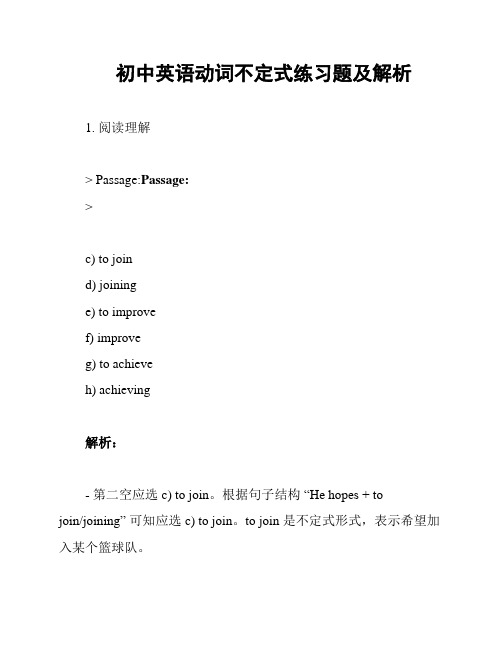
初中英语动词不定式练习题及解析1. 阅读理解> Passage:Passage:>c) to joind) joininge) to improvef) improveg) to achieveh) achieving解析:- 第二空应选 c) to join。
根据句子结构“He hopes + tojoin/joining” 可知应选 c) to join。
to join 是不定式形式,表示希望加入某个篮球队。
- 第三空应选 e) to improve。
根据句子结构“always encourage + to improve/improve” 可知应选 e) to improve。
to improve 是不定式形式,表示鼓励提高某人的技能。
- 第四空应选 g) to achieve。
根据句子结构“help him + to achieve/achieving” 可知应选 g) to achieve。
to achieve 是不定式形式,表示帮助实现某人的目标。
2. 句子转换Change the sentences below by rewriting the underlined phrases using the verb in brackets:> Example:Example:>> Tom wants to visit his grandparents. (see)>> Tom wants [to see] his grandparents.b) We plan to go camping next weekend. (do)c) He hopes to find a new job after graduation. (get)d) They decided to buy a new car for their family. (purchase) 解析:b) We plan [to do] camping next weekend.c) He hopes [to get] a new job after graduation.d) They decided [to purchase] a new car for their family.3. 完形填空> Passage:Passage:>a) to joinb) joiningc) to tryd) tryinge) aref) is解析:- 第一空应选 a) to join。
初中初中英语动词不定式的用法

初中初中英语动词不定式的用法篇一:初中动词不定式用法讲解初中动词不定式用法讲解动词不定式是动词的一种非谓语形式,又叫非谓语动词,它没有人称和数的变化,在句子中不能做谓语;它由“to+动词原形”构成,这里的to是动词不定式符号,本身没有词义,其否定形式常在to前加not;由于它仍保持动词的特点,可以有自己的宾语和状语,还可以带疑问词和由for引出其逻辑主语等形成动词不定式短语;不定式或不定式短语具有名词、形容词和副词的特征,在句子中可作主语、表语、宾语、宾语补足语、定语和状语等句子成分。
为使同学们更好地掌握其用法,现总结如下:一、动词不定式作主语动词不定式作主语时,为避免句子的头重脚轻,常用it作为形式主语,而真正的主语动词不定式后置。
如要说明动作的执行者,可在不定式前加for引导的短语;但如果表语是nice, kind, clever等描述动作执行者的性格、品质的形容词时,则应在不定式前加of引导的短语。
常用句型: 1,It +be+adj./n.+(for/of sb.) to do sth.(用of还是for决定于前面的adj, adj若是指sb.的特性,就用of,adj若是指sth的特性就用for)例句:It’s so nice of you to help me with my homework.你真是太好了,帮助我完成作业。
It’s very difficult for me to do the math homework.数学作业对于我来讲太难了。
2,It takes sb. some time to do sth.例句:It takes my mother all day to do the housework.做家务花了我妈妈一整天的时间。
二、动词不定式作宾语一些动词,如want, decide, hope, ask, offer, agree, choose, learn, plan, need, teach,prepare等,常接动词不定式作宾语(如want/decide to do sth.等)。
动词不定式(根据汉语提示填空 15题 含解析)初中英语专题练习
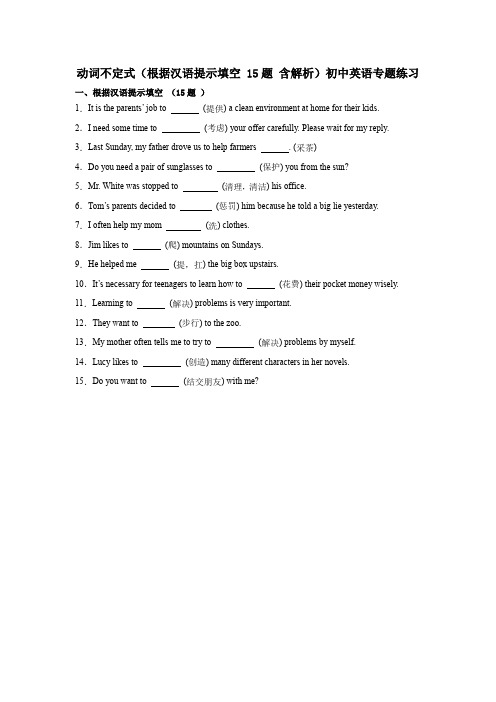
动词不定式(根据汉语提示填空 15题含解析)初中英语专题练习一、根据汉语提示填空(15题)1.It is the parents’ job to (提供) a clean environment at home for their kids.2.I need some time to (考虑) your offer carefully. Please wait for my reply. 3.Last Sunday, my father drove us to help farmers . (采茶)4.Do you need a pair of sunglasses to (保护) you from the sun?5.Mr. White was stopped to (清理, 清洁) his office.6.Tom’s parents decided to (惩罚) him because he told a big lie yesterday.7.I often help my mom (洗) clothes.8.Jim likes to (爬) mountains on Sundays.9.He helped me (提,扛) the big box upstairs.10.It’s necessary for teenagers to learn how to (花费) their pocket money wisely. 11.Learning to (解决) problems is very important.12.They want to (步行) to the zoo.13.My mother often tells me to try to (解决) problems by myself.14.Lucy likes to (创造) many different characters in her novels.15.Do you want to (结交朋友) with me?参考答案:一、根据汉语提示填空(15题)1.provide【详解】句意:在家里为孩子提供一个干净的环境是父母的责任。
初中英语语法精讲动词不定式用法(教案)
初中英语语法精讲动词不定式用法(教案)章节一:动词不定式的概念与构成教学目标:1. 让学生理解动词不定式的概念。
2. 让学生掌握动词不定式的构成。
3. 让学生能够正确运用动词不定式作主语、宾语和表语。
教学内容:1. 动词不定式的概念:动词不定式是一种没有主语和宾语的句子形式,由动词原形加上“to”构成。
2. 动词不定式的构成:动词原形+ “to”。
3. 动词不定式的基本用法:a. 作主语:如:To see is to believe.b. 作宾语:如:I want to go.c. 作表语:如:His goal is to study hard.教学活动:1. 引入动词不定式的概念,让学生通过实例理解。
2. 讲解动词不定式的构成,让学生进行练习。
3. 分组讨论,让学生用动词不定式作主语、宾语和表语造句。
章节二:动词不定式的否定形式教学目标:1. 让学生掌握动词不定式的否定形式。
2. 让学生能够正确运用动词不定式的否定形式。
1. 动词不定式的否定形式:在“to”前面加上“not”,即“not to”。
2. 动词不定式的否定形式的用法:表示否定意义,如:I don't want to go.教学活动:1. 讲解动词不定式的否定形式,让学生进行练习。
2. 小组活动,让学生用动词不定式的否定形式造句。
章节三:动词不定式的疑问形式教学目标:1. 让学生掌握动词不定式的疑问形式。
2. 让学生能够正确运用动词不定式的疑问形式。
教学内容:1. 动词不定式的疑问形式:在“to”前面加上“do/does/did”,如:Do you want to go?2. 动词不定式的疑问形式的用法:用于提问,如:Do you want to go shopping?教学活动:1. 讲解动词不定式的疑问形式,让学生进行练习。
2. 小组活动,让学生用动词不定式的疑问形式提问。
章节四:动词不定式作主语教学目标:1. 让学生掌握动词不定式作主语的用法。
冀教版初中英语八年级动词不定式(讲解+练习)(1)
动词不定式1. 动词不定式位置:(1)动词不定式作表语To lose is to learn. 失败就是学习。
Ψ表语表语是谓语的一部分,它位于系动词如be之后,说明主语身份,特征,属性或状态。
一般由名词,代词,形容词,副词,不定式,介词短语等充当。
I am a teacher.(2)动词不定式作主语It is better to give than to take. 给予比接受更好。
Ψ主语主语表示句子主要说明的人或事物,一般由名词,代词,数词,不定式等充当。
He likes watch TV.(3)不定式作宾语Expect to be treated as you have treated others.你怎样待别人,就指望别人怎样待你。
Ψ宾语宾语表示动作行为的对象,跟在及物动词之后。
能作宾语的有名词,代词,数词,动词不定式等。
We all like play basketball.√.I’ve worked with children before, so I know what ________ in my new job.A. expectedB. to expectC. to be expectingD. expects(4)不定式作宾补Adversity causes some men to break,others to break records.逆境使一些人崩溃,也使一些人破记录。
Ψ宾补就是宾语补足语,就是补充说明宾语的。
I know you are a student good at maths.(在这个句子中,good at maths 就是补语) I know you are a student who is good at maths.(宾语补语也可以是句子)I see you crossing the street.(还可以是-ing 形式)√. I saw him _______ out of the room.A. goB. had goneC. has goneD. goes(5)不定式作定语There is a time to talk and a time to act.该说的时候说,该做的时候做。
初中英语动词不定式与动名词专项练习
初中英语动词不定式与动名词专项练习一、动词不定式的用法1)作主语To learn English well is not easy. 或It is not easy to learn English well.2)作表My wish is to become a teacher。
3)作宾语Most of us like to watch football matches。
4)作宾语补足语He told me to be here on time。
5)作定语I have nothing to say about that thing.6)作状语He stopped to have a look。
否定形式:not + to + 动词原形构成例如:He asked me not to make such a mistake。
2、动词不定式与疑问词连用:例如:(1) He doesn't know how to use the machine. (不定式作宾语)(2)How to use the machine is a question。
(不定式作主语)(3)The question is when to go there. (不定式作表语)3、省to 的动词不定式1)使役动词let, have, make:2)感官动词see, watch,look at,notice,hear,listen to, smell, feel,find 等后作宾补,省略to。
3)would rather,had better + do4、不定式的特殊句型:1)too…to…:太…而不能…He is too excited to speak.2)enough to do:足以做…The child is old enough to go to schooll3)Why not +动词原形"表达向某人提出建议Why not take a holiday?4)so as (not)to do:表示目的Go in quietly so as not to wake the baby。
第十二章动词不定式(思维导图+知识梳理+好题精炼)2022-2023初中英语中考语法归纳
第十二章动词不定式思维导图知识梳理一、不定式概述动词不定式的基本形式是:“to+动词原形”,有时可以不带to.不带to的不定式与动词原形同形,但它不是原形,而是一种语法形式.除基本助动词do和情态动词外,英语动词都有不定式形式.动词不定式没有人称和数的变化,在句子中不能作谓语,但可以担任除谓语外的任何成分-主语、表语、宾语、定语、状语和宾语补足语.动词不定式和它的宾语或状语构成不定式短语.不定式有时态、语态变化(以do为例):主动语态被动语态一般式to do to be done进行式to be doing-完成式to have done to have been done 完成进行式to have been doing-动词不定式的句法作用(一)作主语用作主语的动词不定式通常表示一种具体的、特定的行为,其谓语动词用第三人称单数形式.To obey the laws is everyone's duty.服从法律是每个人的职责.How to use the computer is a question.怎么使用计算机是一个问题.How to get there is not decided yet.怎样去那里还没决定下来.点拨(1)在很多情况下,常用it作形式主语,而把真实主语不定式放在谓语之后.It was difficult to sell my car.我的车很难卖掉.It's not known where to stay for the night.在哪里过夜还不知道.(2)如果要表示不定式的动作是谁做的,一般在不定式前加一个for短语.It will be a regret for us not to help him.我们没有帮助他是个遗憾.(3)在某些形容词(如kind,good,nice,wise,unwise,clever,silly,wrong,right,foolish,stupid,careless, considerate,rude,naughty,impolite等)作表语时,不定式前常可加一个以of引起的短语,来说明不定式指的是谁的情况.It would be rude of us to refuse their invitation.(我们)拒绝他们的邀请,会显得无礼.(二)作表语作表语,一般紧跟在系动词,如:be,seem,get等后面,用以说明主语.The question is when to start.问题是什么时候启程.You seem to have lost weight.你好像减肥了.What we have to do first is to find a solution.我们得做的第一件事是找出一个解决办法.点拨当不定式所作的表语仅用来说明主语的内容时,这个不定式只作单纯的表语,而不具有未来的含义.(三)作宾语能以不定式作宾语的动词很多,常见的有:agree,begin,decide,expect,forget,hope,learn,like,manage, pretend,start,try,want,wish等.Do you wish to see the manager?你想见经理吗?They decided to learn English hard.他们决定好好学英语.Don't forget to meet me at6:00.别忘了六点钟和我见面.有些动词,如:tell,advise,show,teach,know,forget,learn,remember,show,understand,see,wonder,hear, find out,explain,decide,discuss等后面,常用带疑问词的不定式作宾语.We don't know who(whom)to ask.我们不知道问谁.We asked how to get to the station.我们问怎么到达车站.Have you decided where to go for your holidays?你们决定到哪儿度假了吗?I don't know whether to apply for the job or not?那份工作我不知道申请还是不申请?(四)作定语I have no time to waste.我没有时间可浪费.Let me find a place to park.我来找个停车的地方.He is always the first to come to work and the last to leave.他总是第一个来上班,最后一个走.点拨不定式修饰something,anything,nothing时,放在它们的后面.如果something,anything,nothing有形容词来修饰,词序是something(nothing...)+形容词+不定式.My father had something to do.我父亲有事要办.Have you got anything important to buy?你有什么重要的东西要买吗?(五)作状语不定式常可用作状语,修饰动词,表示行为的目的、结果、原因等.一般放在被修饰词之后,但在表示目的时,为了强调也可放在句首.1.作目的状语为加强语气在否定式前还可加上in order或so as组成词组(即:in order to...,so as to...),作状语表示目的.To live a long and healthy life,we must learn to have a balanced diet.为了能过长寿而健康的生活,我们必须懂得吃均衡的食品.I stayed there so as to see what would happen.我留在那儿,为的是想看看会发生什么事.In order to help him,we would do everything we can.为了帮助他,我们愿意尽一切力量.2.作结果状语表结果,其逻辑主语通常亦是全句的主语.在“so...as to...”“such...as to..“enough to...”“only to...”以及“too...to...”等结构中的不定式皆表示结果.She is old enough to go to school.她已到了可以上学的年龄了.He was too drunk to drive home.他酩酊大醉,没法开车回家.3.作原因状语She trembled to think of the terrible accident.想到那可怕的车祸,她就不寒而栗.We jumped with joy to hear the news.听到这消息,我们都高兴地跳了起来.(六)宾语补足语1、有很多动词的后面都可以有不定式作宾语补足语常见的这类动词有:advise,ask,tell,help,wish,want, expect,forbid,persuade,press,request,teach,warn等.She asked her grandfather to play game with her.她请爷爷跟她一起做游戏.Mother told me to cook the meal.妈妈叫我做饭.2.有一些动词后用作宾语补足语的不定式通常不带to,这种动词有两类:一类是感觉动词,另一类是使役动词感觉动词:如feel,see,hear,watch,notice等.使役动词:如make,let,have等.Let me do it for you.让我来替你做.Don't let her go out.别让她出去.I made him work hard.我迫使他加劲干.(1)动词help之后,复合宾语中的不定式可带to,亦可不带to.在上述动词转换为被动结构时,其后的不定式必须带to.He was seen to enter the theatre.有人看见他走进了剧院.I was made to do my homework the whole night.我被迫整晚做作业.Can you help me(to)move this table?你能帮我移动一下这张桌子吗?(2)感官动词的宾语补足语有两种形式:不带to的不定式和动词-ing形式.I heard Meimei singing in her room when I went past.我路过的时候听见梅梅在房间里唱歌.(路过的瞬间正在唱,所以用singing)We often hear Meimei sing in her room.我们经常听见梅梅在房间里唱歌.(经常听见,用不定式)I saw him come in.I saw him coming in.两句话的意思都一样:我看见他进来.用不定式着重于动作的全过程,用动词-ing形式则是强调当时动作的进行情况.3.当谓语动词为think,make,find,consider,feel,regard等词,作宾语的不定式后面有宾语补足语时,常用it作形式宾语,而将真正的宾语放在补足语的后面I find it easy to learn English well.我发现要把英语学好很容易.三、不定式的主要句型及注意事项(一)不定式的否定式不定式的否定式:not+不定式,经常和ask(tell)sb.to do sth.句型连用.She asked me not to drive him to the station.她要我不要开车送他到车站.Try not to be late.争取不要迟到.Mary asked me not to give my pen to Jimmy.玛丽让我别把笔给吉米.She decided not to come here again.她决定不再到这儿来.点拨不定式的否定式和否定句的区别:I asked him not to open the door.我让他别把门打开.I didn't ask him to open the door.我没让他把门打开.(二)不定式的进行时态进行式:表示在谓语动词所表示的动作或状态发生时正在进行.It's nice to be sitting here with you.在这儿陪你坐着是非常愉快的.It is unwise for him to be talking that topic all the time.他老是谈论这件事,很不明智.(三)不定式的完成时态完成式表示在谓语动词的动作或状态发生时已经完成.She said she was sorry to have missed you.她说她没见到你很遗憾.He seemed to have visited our factory.他好像参观过我们的工厂.They appeared to have met before.他们看来以前见过面.(四)动词不定式的被动语态表示被动意义I didn't want to be told about it.我不想被告知这件事.Nothing seems to have been forgotten.似乎什么也没有被遗忘.The building is said to have been destroyed in a fire two years ago.据说这幢大楼两年前已毁于一场大火.在以某些形容词,如kind,good,silly,honest,bad,stupid,bold,clever,cruel,courteous,nice,rude,sensible, tactful,wise,wrong等作表语时,后面需用以“of+名词(或代词宾格)+不定式”结构,以说明不定式所表示的动作的执行者是谁(即of短语是不定式的逻辑主语).It's very good of you to come.谢谢你的光临.How silly of you(it is)to make such a mistake!你出了这样的差错,多傻啊!It's very kind of you to say so.多谢你这么说.在had better,had best,would rather,would rather...than,would sooner,would sooner...than,cannot but,do nothing but等结构后面的不定式要省略“to”.You had better write it in English.你最好用英文写.I would rather stay at home.我宁愿待在家里.好题精练一、用-ing形式或不定式的适当形式完成句子1.Do you enjoy_________football?(play)2.Fred didn't have any money,so he decided_________a job.(take)3.We're going out for dinner,Would you like_________us?(join)4.The teacher reminded the students_________their test paper on time.(finish)5.When I was tired,I enjoyed_________TV.(watch)6.It was a nice day,so the old man agreed_________for a walk.(go)7.I'm not in a hurry,I don't mind_________.(wait)答案:1.playing2.to take3.to join4.to finish5.watching6.to go7.waiting二、选择括号内所给词组完成句子,注意括号内“go+v.-ing形式”构成固定搭配的用法(go boating;go fishing;go dancing;go running;go skating;go hunting;go singing)1.She's a good dancer.She always_________on Saturday.2.I've got a gun.I'll_________with that strong hunter next weekend.3.“Where is Tim?”“He has._________He always runs in the morning.”4.We have enough fish to eat.Our father_________every day.答案:1.goes dancing2.go hunting3.gone running4.goes fishing三、仿照示例改写下列句子示例:It is very interesting to play baseball.→To play baseball is very interesting.1.lt was not polite to speak that way before Mr.Lee.____________________________________________________________________________________________ 2.It can be quite easy to travel by air.____________________________________________________________________________________________ 3.lt will be no problem to arrive there before noon.____________________________________________________________________________________________4.To make those strangers believe us was so difficult.____________________________________________________________________________________________ 5.To help Tom speak Chinese well is not at all easy.____________________________________________________________________________________________答案:1.To speak that way before Mr.Lee was not polite.2.To travel by air can be quite easy.3.To arrive there before noon will be no problem.4.It was so difficult to make those strangers believe us.5.It is not at all easy to help Tom(to)speak Chinese well.四、选择填空1._________the bookstore,he stopped_________a few books.A.Passing;buyingB.Passing;to buyC.To pass;buyingD.Having passed;to buy2.Bruce,look at your dirty shoes,You'd better_________them right now.A.washedB.washingC.washD.to wash3._________the room,I found the computer_________.A.Entering;stealingB.Entering;stolenC.To enter;stealD.To enter;stealing4.We've worked hard for nearly one hour.Let's stop_________a rest now.A.haveB.to haveC.havingD.have had5.My mother always tells me not_________to the net bars(网吧).A.goB.to goC.goesD.going6.The teacher asked us_________English for half an hour in the morning.A.reads B reading C.to read D.read7.You will have to get up early tomorrow.Stop_________TV,Peter.A.watchesB.watchC.to watchD.watching8.I find it hard_________English well.A.learnB.learningC.to learnD.learns9.The teacher asked John_________a short talk in our class meeting.A.giveB.to giveC.gaveD.giving10.The girl was too poor_________a houseA.to buy;to live inB.to buy;to liveC.buy;to liveD.buying;living in11.It was very late at night,but Mr.Brown still went on_________.A.worksB.workedC.workingD.work12.Remember_________him about it before he goes away.A.tellB.to tellC.tellingD.to telling13.Lin Tao is strong enough_________the big box.A.carryB.to carryC.carryingD.carries14.Her mother told her_________in bed.A.not readB.not to readC.don't readD.to not read15.When class began,we stopped_________to the teacher carefully.A.listeningB.listenC.listensD.to listen16.You'd better_________the cinema by bus.A.don't goB.to goC.to go toD.go to17.What did the manager_________you to_________at the meeting?A.tell;sayB.ask;speakC.tell;speakD.ask;talk18.Tom was let_________in the gate house.A.waitB.to waitC.waitingD.to have waited19.Mr.Hu has enough time_________the job in two days.A.finishB.to finishC.finishingD.finished20.Look,the building_________is our library.A.is repairedB.being repairedC.repairingD.to be repairing21._________no money,I could not buy this coat.A.HaveB.HavingC.To haveD.Have had22.The teacher has something important_________us.A.to tellB.tellsC.tellingD.told23.Li Ming didn't know_________next.A.to do whatB.what to doC.how to doD.what do24.I'd love_________to your birthday party.eB.cameC.to comees25.It took me two hours_________by bus.A.to get thereB.to get to thereC.get thereD.get to there答案:1-5BCBBB6-10CDCBA11-15CBBBD16-20DABBB21-25BABCA五、改正下列句子的错误1.He seems to not hear from her.____________________________________________________________________________________________ 2.I hope see you soon.____________________________________________________________________________________________ 3.I made them to give the money back.____________________________________________________________________________________________ 4.The scientist gave us some advice on how learning English.____________________________________________________________________________________________ 5.No one noticed him to leave the room.____________________________________________________________________________________________ 6.Have you given up to smoke?____________________________________________________________________________________________ 7.We found him waited at the school gate.____________________________________________________________________________________________ 8.Why not to turn off the light?____________________________________________________________________________________________ 9.She didn't want me go.____________________________________________________________________________________________ 10.I don't know to swim.____________________________________________________________________________________________ 11.China is a developed country belonging to the third world.____________________________________________________________________________________________ 12.It's getting dark.We have to find a hotel to live.____________________________________________________________________________________________ 13.He said he had an important meeting to attended.____________________________________________________________________________________________ 14.They don't allow that people smoke.____________________________________________________________________________________________ 15.It's difficult sell my car.____________________________________________________________________________________________答案:1.He seems not to...2.I hope to see...3.I made them give...4....how to learn...5....him leave...6....given up smoking?7...him waiting...8.Why not turn off...9.She didn't want me to go.10.I don't know how to swim.11....a developing...12....to live in13....to attend.14....people to smoke.15...to sell my car.。
- 1、下载文档前请自行甄别文档内容的完整性,平台不提供额外的编辑、内容补充、找答案等附加服务。
- 2、"仅部分预览"的文档,不可在线预览部分如存在完整性等问题,可反馈申请退款(可完整预览的文档不适用该条件!)。
- 3、如文档侵犯您的权益,请联系客服反馈,我们会尽快为您处理(人工客服工作时间:9:00-18:30)。
动词不定式
一. 定义:
动词不定式是非谓语动词的一种,它没有人称和数的变化,在句子中不能独立作谓语,但它仍保持动词的特点,既可以有自己的宾语和状语。
同时动词不定式又具有名词、形容词、副词的特征,在句中可以作主语、表语、宾语、宾语补足语、定语和状语。
二. 动词不定式的构成:to+动词原形
三. 动词不定式作宾语
后面能接不定式作宾语的动词有:agree, ask, choose, decide, forget, hope, learn, want, wish, would like等。
We hope to get there before dark. 我们希望天黑以前到那儿。
The girl decided to do it herself. 那个姑娘决定自己做那件事。
动词不定式作宾语的注意事项(2点)
1. 有些动词既可跟不定式作宾语,也可跟动名词作宾语,但含义不同:
remember to do 记住要做某事 remember doing 记得曾经做过某事
forget to do忘记要做某事 forget doing 忘记曾经做过某事
stop to do 停下来去做某事 stop doing 停止做某事
go on to do 继续做另一件事 go on doing 继续做原来在做的事
I remember seeing you somewhere before.
我记得以前在哪儿见过你。
Please remember to turn off the light when you leave.
离开时请记得关好灯。
2. 不定式作宾语时,如带有宾语补足语,则要把不定式放到后面,用it作形式宾语,构成“主语+动词+it+宾补(形容词、名词)+不定式”结构。
如:He found it very difficult to get to sleep. 他发现很难入睡。
四. 动词不定式作宾语补足语
1. 后面能接to不定式作宾语补足语的动词有:ask, order, teach, tell, want, wish, help 等。
The teacher told us to do Exercise 1. 老师要我们做练习一。
I want both of you to go. 我要你们俩去。
We helped her (to) repair her bike. 我们帮助她修理自行车。
2. 使役动词let, have, make及感官动词see, watch, notice, hear, feel等要以不带
to的不定式作宾补。
Let’s have a rest. 我们休息一会吧。
I saw him come in. 我看见他进来了。
感官动词后既可跟不带to的不定式作宾补,也可跟v-ing作宾补,前者表示动作的全部过程已结束;后者表示动作正在进行。
I saw him come downstairs.我看见他下了楼。
(说明他下楼了这件事)
I saw him coming downstairs.我看见他在下楼。
(说明他下楼时的情景)
( ) 1. I often see Tom on the playground. When I passed the playground yesterday, I saw him .
A. play; playing
B. to play; play
C. playing; to play C. playing; play
( ) 2. — What does the sign on the bottle mean?
—It means “”.
A. This side up
B. Dangerous
C. Recyclable
D. No Parking
( ) 3. When the player finished running, he was out of .
A. breather
B. breathing
C. breath
D. the breath
( ) 4. — How about going hiking this weekend?
— Sorry, I prefer rather than .
A. to stay at home; go out
B. to go out; stay at home
C. staying at home; go out
D. going out; stay at home
( ) 5. —We really shouldn’t use plastic bags any more whe n shopping.
—It’s important to protect our environment.
A. So does it.
B. With pleasure.
C. That’s OK.
D. So it is.
( ) 6. —
— To the supermarket with Wang Fan.
A. Where have you gone?
B. Where did you go to the supermarket?
C. Where have you been?
D. Where’s Wang Fang?
( ) 7. I afraid of the dark, but now I don’t.
A. use to
B. used to
C. use to be
D. used to be
( ) 8. The earth is years old.
A. four thousands six hundreds
B. four thousand six hundred
C. four thousand and six hundred million
D. four thousand six hundred millions
( ) 9. They have made so great progress .
A. three years ago
B. for three years
C. in the past three years
D. before three years
( ) 10. — Has Li Hong gone to the library?
— Pardon?
— I asked the library.
A. if Li Hong had gone to
B. if had Li Hong gone to
C. Li Hong had gone to
D. has Li Hong gone to
( ) 11. — Oh, Miss Wei. Your skirt looks nice. Is it new?
— No, I it since three years ago.
A. had
B. bought
C. have had
D. have bought
( ) 12. — Must they clean and tidy the classroom now?
— No, they . It after school in the afternoon.
A. mustn’t; must clean
B. needn’t; must clean
C. mustn’t; need be cleaned
;D. don’t have to; can be cleaned
( ) 13. —It’s one o’clock now. I must go.
—It’s raining outside. Don’t leave it stops.
A. when
B. since
C. while
D. until。
